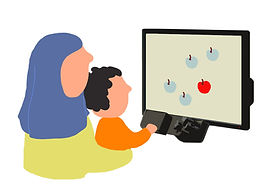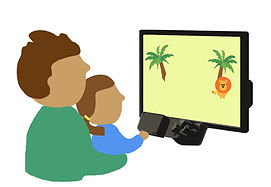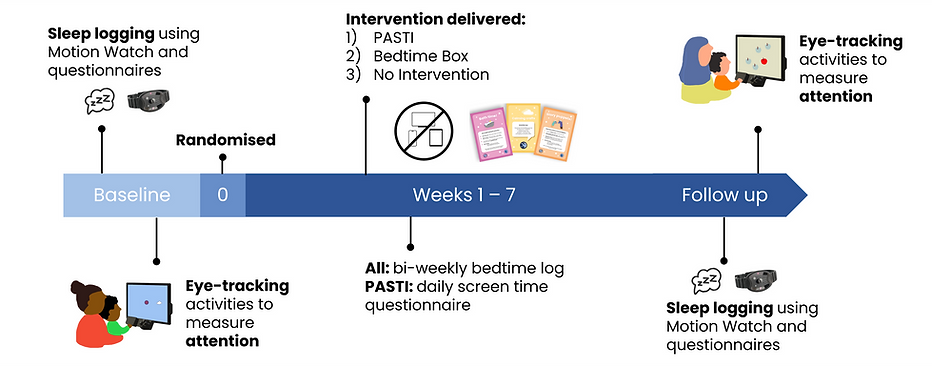Over the last decade there has been an increase in toddlers use of screen media (e.g., TV, tablets, smartphones). Some research has shown that toddlers who have more screen time have poorer sleep and differences in their attention, for example greater difficulties concentrating (Cheung et al., 2017; Portugal et al., 2021a and 2021b). Early-years organisations recommend that children under 5 should have no more than one hour of screen time per day and no screen time in the hour before bed. However, there is currently very little evidence to support these recommendations in toddlers.
This project offers a first step to try and find out whether screen time has a direct impact on toddler's sleep and attention.
In this Nuffield Foundation-funded* project** we asked families to take part in a Parent-Administered Screen Time Intervention (PASTI) with their 17-to-31 month old toddler. The intervention was co-design with parents and early years practitioners from Early Years Alliance (EYA), National Childbirth Trust (NCT) and The Sleep Charity. Over 7-weeks we measured the impact that removing screen time before bed had on toddler's sleep and attention. The project took place in family’s homes and at the Centre for Brain and Cognitive Development (commonly known as the ‘Babylab’) at Birkbeck, University of London.
*The Bedtime Boost Study was funded by a Nuffield Foundation grant awarded to Prof. Tim Smith, Prof. Rachael Bedford and Dr. Ben Carter.
**The Bedtime Boost Study received ethical approval from the Birkbeck, Psychological Sciences ethics committee (Ref: 2122037)

PROJECT DETAILS
A total of 105 families from a range of backgrounds around London took part in our Bedtime Boost Study. Families completed some eye-tracking activities in the Babylab to measure attention and toddlers wore a Motion Watch at home to measure sleep.

Motion watch to measure sleep
Eye-tracking activities to measure attention


At the start of the trial families were randomly assigned to one of three groups. Families were either assigned to the 1) PASTI group, 2) Bedtime Box group or 3) No Intervention group. Families in the PASTI group were asked to help their toddler avoid all screen time in the hour before bed for 7-weeks. They were given a Family Bedtime Box (see image below) filled with toys and activity cards to use with their toddler to help them avoid screen time and get ready for sleep. Families in the Bedtime Box group were given a Family Bedtime Box to use with their toddler in the hour before bed, and were not told anything about avoiding screen time. Families in the No Intervention group were told to continue with their toddlers usual bedtime activities. Families in the Bedtime Box and No Intervention groups were told about the true purpose of the intervention (i.e. removal of screen time) at the end of the study.
Family Bedtime Box

Activity Cards



The full timeline of the intervention is shown in the image below.


KEY FINDINGS
What did we find?
-
A randomised controlled trial of toddler screen time in the hour before bed is highly feasible.
-
Parents in the intervention group (PASTI) were able to successfully remove toddler screen time before bed, and their toddler's sleep quality improved, with more efficient nighttime sleep and fewer night awakenings.
-
There was no observable effect of PASTI on our measures of toddler attention.
-
The improvements in sleep quality for PASTI toddlers may be due to the specific removal of screen time, not the other activities that replaced it as the same improvements were not found for the Bedtime Box-Only toddlers.
-
Full trial feasibility and efficacy findings can be found here.
What did parents say about our study?
Some families completed a feedback questionnaire and took part in a semi-structured interview to tell us about their experiences of taking part in our study. Here are some examples of families experiences.
"It was easy to implement for us. We only had minor challenges which we quickly adjusted to. We are planning to continue with recommendation and reduced screen time during the day as well."
PASTI Family
"We loved everything in the box and the ideas for games, we've had some quality family time in the hour before bed. We've made up our own games and had lots of fun and will definitely keep playing together before bed, and trying to focus on play throughout the day."
Bedtime Box Family
"I think very consciously stopping screen time an hour before bed did help my child get to sleep quicker. he seemed more sleepy and ready for bed. I also think it was good for us to be more present and actively play together before bed."
PASTI Family
"I was already thinking about the ways to limit screen time in general when we joined the study. I was enthusiastic about implementing the change and it turned out easier than I anticipated."
PASTI Family
MEET THE TEAM
Past Placement Students
Katie Baulcombe (University of Bath)
Jemima Cowley (Westminster University)
Nina Tan (University of Bath)
Past Volunteers
Zoe Howell
Qiaoyu Zhou
TALKS & PUBLICATIONS



















